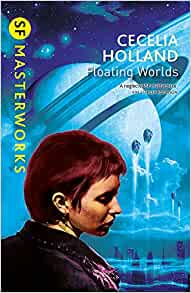Floating Worlds by Cecelia Holland (book review).
‘Floating Worlds’ by Cecelia Holland is a Science Fiction space opera set within the Solar System. Originally published in 1976, its imaginative ideas for the time and wide-ranging interlaced themes made it into a classic. It deserves its place in Gollancz’s SF Masterworks.
Earth has suffered from global warming and pollution. There are domes scattered everywhere, mainly used to protect people from pollution, but a few are museums like the underwater one of New York’s ruins. Earth is an anarchy, ‘No government. No laws. No army.’
Work is hard to come by. Paula Mendoza applies for many jobs, including one for the Committee, a worldwide company that negotiates contracts and runs diplomatic errands for the rest of the Middle Planets. She gets accepted because she is one of the very people who can speak Styth, the language of mutants who live in artificial cities in the gas planets, Uranus and Saturn. Her first job is to negotiate a truce between the Middle Planets and the Styth Empire.
The Styth are a conglomeration of states that use normal humans as slaves and expect women to stay at home. Their overall leader is chosen through fighting the other city leaders in the pit. Despite this barbaric way of life, there is a code of conduct that keeps them together as an empire that wishes to conquer the whole of the Solar System.
Paula is selected as lead negotiator and meets her opposite number, Saba, Akellar of Matuko, the city of Barsoom on Mars. When conventional negotiations fail to get anywhere, Paula has to resort to personal unconventional means. This is the start of strange adventure that leads her through the Solar System, spending long periods in the Styth Empire.
The science and technology are reasonably extrapolated from what was known at the time of original publication in 1976. For instance, the colour of Uranus is described as white. This was before Voyager 2 visited it in 1986, when its colour was discovered to be blue-green. As with the majority of Science Fiction novels written before the 1980s, the information technology is clunky by today’s standards but, set aside this mismatch of current technology expectations, ‘Floating Worlds’ has a lot to say.
Various political government systems, including anarchy, democracy, dictatorship and oligarchy, exist side by side. We can see their comparisons and how they interact. The novel can be considered a political treatise seen through the eyes of the 1970s, which in many respects is still relevant to today’s world.
This novel belongs to that enthusiastic wave of feminism that battered its way into Science Fiction in the 1970s. Throughout the novel, we are frequently reminded of the comparison between women who are kept in harem-like circumstances and those who play major parts in Solar System’s development.
Its title, ‘Floating Worlds’, not only refers to enclosed cities floating in the clouds of Saturn and Uranus, and the moving pieces of the political game, but also to the way personalities are forced to change by the circumstances they find themselves in. Character development of the main protagonists is both subtle and shocking but follows quite naturally from the events that occur in the novel.
The writing style tends towards simple sentences describing what is going on. It does not use Paula’s voice of consciousness. Instead, it teases the reader to work out why what happens does.
To summarise: despite its obvious signs of technological aging and its simplistic writing style, ‘Floating Worlds’ has a depth and complexity of reaction to expansion in the Solar System that is thought provoking and intriguing. This is definitely a novel for thinkers.
Rosie Oliver
April 2022
(pub: Gollancz SF Masterworks, 2011. 628 pages paperback. Price: £10.99 (UK). ISBN: 978-0-575-10823-3)
check out website: https://www.sfgateway.com/titles/cecelia-holland/floating-worlds/9780575108257/


I believe that this is the only SF novel she wrote – something I regret – and it is certainly one that deserves its place in the Masterworks list.